 It's no surprise that French-Canadian writer/director Denys Archand
(Jesus of Montreal, Stardom) received critical acclaim for his social
commentary masterpiece, The Barbarian Invasions, including some
spotlight time at this year's Academy Awards. The film's major theme, a
father's deathbed enlightenment, is set in post-September 11 Quebec,
complete with its ailing medicare system and social infrastructure. The
plot revolves around the story of Rémy, a father dying of cancer and
Sébastien, the successful yet bitter son, making amends before the
inevitable occurs. Though an all too familiar scenario, Archand takes a
unique approach by having it play out as a reunion of the highly
intellectual characters from his 1986 film, The Decline of the American
Empire. A younger Rémy, as a brilliant university history professor,
had boasted of his philandering lifestyle. With The Barbarian
Invasions, this has now destroyed his marriage and set the tone of the
relationship with his resentful son. Upon learning from his mother of
the love and devotion his father paid him as a child, Sébastien has a
change of heart. He decides to use his plentiful finances to bribe
hospital staff and union officials into creating a private tier of
healthcare on the premises to ensure Rémy's final days are spent in
greater comfort. This now includes the use of heroin as medication,
prescribed and administered by Nathalie, a childhood friend of
Sébastien's turned junkie. The gathering of old friends and lovers
turns into a bedside roast for their ailing colleague and has them
recalling philosophies of life, love, sex and politics from their
earlier days, some of which they still appear to practice. While I
found a lot of these discussions to be intriguing and quite profound,
there were times when the themes become overstated, almost to the point
of becoming pedestrian. The film's title is introduced and interpreted
during the group's discussions on world views and cultures, to which
television images in the background recall the scene of the plane
hitting the second tower in NYC to strengthen one meaning; the most
obvious meaning being the central character's battle with cancer.
Archand also shows the church, perhaps the most powerful body in
Quebec, doing business with Gaëlle, Rémy's art dealing fiancée, in an
attempt to sell off some its precious and plentiful artifacts in order
to raise funds after its legal problems of late. The film's title takes
on the most powerful of meanings when she informs them that they are
now worthless on the world market; the most sacred of values pillaged
by the society that held them. An emotionally powerful and
thought-provoking film, The Barbarian Invasions had me reflecting on my
relationships with family and friends and at the same time question and
compare my present personal values in certain areas of society with
that of my own youth.
It's no surprise that French-Canadian writer/director Denys Archand
(Jesus of Montreal, Stardom) received critical acclaim for his social
commentary masterpiece, The Barbarian Invasions, including some
spotlight time at this year's Academy Awards. The film's major theme, a
father's deathbed enlightenment, is set in post-September 11 Quebec,
complete with its ailing medicare system and social infrastructure. The
plot revolves around the story of Rémy, a father dying of cancer and
Sébastien, the successful yet bitter son, making amends before the
inevitable occurs. Though an all too familiar scenario, Archand takes a
unique approach by having it play out as a reunion of the highly
intellectual characters from his 1986 film, The Decline of the American
Empire. A younger Rémy, as a brilliant university history professor,
had boasted of his philandering lifestyle. With The Barbarian
Invasions, this has now destroyed his marriage and set the tone of the
relationship with his resentful son. Upon learning from his mother of
the love and devotion his father paid him as a child, Sébastien has a
change of heart. He decides to use his plentiful finances to bribe
hospital staff and union officials into creating a private tier of
healthcare on the premises to ensure Rémy's final days are spent in
greater comfort. This now includes the use of heroin as medication,
prescribed and administered by Nathalie, a childhood friend of
Sébastien's turned junkie. The gathering of old friends and lovers
turns into a bedside roast for their ailing colleague and has them
recalling philosophies of life, love, sex and politics from their
earlier days, some of which they still appear to practice. While I
found a lot of these discussions to be intriguing and quite profound,
there were times when the themes become overstated, almost to the point
of becoming pedestrian. The film's title is introduced and interpreted
during the group's discussions on world views and cultures, to which
television images in the background recall the scene of the plane
hitting the second tower in NYC to strengthen one meaning; the most
obvious meaning being the central character's battle with cancer.
Archand also shows the church, perhaps the most powerful body in
Quebec, doing business with Gaëlle, Rémy's art dealing fiancée, in an
attempt to sell off some its precious and plentiful artifacts in order
to raise funds after its legal problems of late. The film's title takes
on the most powerful of meanings when she informs them that they are
now worthless on the world market; the most sacred of values pillaged
by the society that held them. An emotionally powerful and
thought-provoking film, The Barbarian Invasions had me reflecting on my
relationships with family and friends and at the same time question and
compare my present personal values in certain areas of society with
that of my own youth. It's no surprise that French-Canadian writer/director Denys Archand
(Jesus of Montreal, Stardom) received critical acclaim for his social
commentary masterpiece, The Barbarian Invasions, including some
spotlight time at this year's Academy Awards. The film's major theme, a
father's deathbed enlightenment, is set in post-September 11 Quebec,
complete with its ailing medicare system and social infrastructure. The
plot revolves around the story of Rémy, a father dying of cancer and
Sébastien, the successful yet bitter son, making amends before the
inevitable occurs. Though an all too familiar scenario, Archand takes a
unique approach by having it play out as a reunion of the highly
intellectual characters from his 1986 film, The Decline of the American
Empire. A younger Rémy, as a brilliant university history professor,
had boasted of his philandering lifestyle. With The Barbarian
Invasions, this has now destroyed his marriage and set the tone of the
relationship with his resentful son. Upon learning from his mother of
the love and devotion his father paid him as a child, Sébastien has a
change of heart. He decides to use his plentiful finances to bribe
hospital staff and union officials into creating a private tier of
healthcare on the premises to ensure Rémy's final days are spent in
greater comfort. This now includes the use of heroin as medication,
prescribed and administered by Nathalie, a childhood friend of
Sébastien's turned junkie. The gathering of old friends and lovers
turns into a bedside roast for their ailing colleague and has them
recalling philosophies of life, love, sex and politics from their
earlier days, some of which they still appear to practice. While I
found a lot of these discussions to be intriguing and quite profound,
there were times when the themes become overstated, almost to the point
of becoming pedestrian. The film's title is introduced and interpreted
during the group's discussions on world views and cultures, to which
television images in the background recall the scene of the plane
hitting the second tower in NYC to strengthen one meaning; the most
obvious meaning being the central character's battle with cancer.
Archand also shows the church, perhaps the most powerful body in
Quebec, doing business with Gaëlle, Rémy's art dealing fiancée, in an
attempt to sell off some its precious and plentiful artifacts in order
to raise funds after its legal problems of late. The film's title takes
on the most powerful of meanings when she informs them that they are
now worthless on the world market; the most sacred of values pillaged
by the society that held them. An emotionally powerful and
thought-provoking film, The Barbarian Invasions had me reflecting on my
relationships with family and friends and at the same time question and
compare my present personal values in certain areas of society with
that of my own youth.
It's no surprise that French-Canadian writer/director Denys Archand
(Jesus of Montreal, Stardom) received critical acclaim for his social
commentary masterpiece, The Barbarian Invasions, including some
spotlight time at this year's Academy Awards. The film's major theme, a
father's deathbed enlightenment, is set in post-September 11 Quebec,
complete with its ailing medicare system and social infrastructure. The
plot revolves around the story of Rémy, a father dying of cancer and
Sébastien, the successful yet bitter son, making amends before the
inevitable occurs. Though an all too familiar scenario, Archand takes a
unique approach by having it play out as a reunion of the highly
intellectual characters from his 1986 film, The Decline of the American
Empire. A younger Rémy, as a brilliant university history professor,
had boasted of his philandering lifestyle. With The Barbarian
Invasions, this has now destroyed his marriage and set the tone of the
relationship with his resentful son. Upon learning from his mother of
the love and devotion his father paid him as a child, Sébastien has a
change of heart. He decides to use his plentiful finances to bribe
hospital staff and union officials into creating a private tier of
healthcare on the premises to ensure Rémy's final days are spent in
greater comfort. This now includes the use of heroin as medication,
prescribed and administered by Nathalie, a childhood friend of
Sébastien's turned junkie. The gathering of old friends and lovers
turns into a bedside roast for their ailing colleague and has them
recalling philosophies of life, love, sex and politics from their
earlier days, some of which they still appear to practice. While I
found a lot of these discussions to be intriguing and quite profound,
there were times when the themes become overstated, almost to the point
of becoming pedestrian. The film's title is introduced and interpreted
during the group's discussions on world views and cultures, to which
television images in the background recall the scene of the plane
hitting the second tower in NYC to strengthen one meaning; the most
obvious meaning being the central character's battle with cancer.
Archand also shows the church, perhaps the most powerful body in
Quebec, doing business with Gaëlle, Rémy's art dealing fiancée, in an
attempt to sell off some its precious and plentiful artifacts in order
to raise funds after its legal problems of late. The film's title takes
on the most powerful of meanings when she informs them that they are
now worthless on the world market; the most sacred of values pillaged
by the society that held them. An emotionally powerful and
thought-provoking film, The Barbarian Invasions had me reflecting on my
relationships with family and friends and at the same time question and
compare my present personal values in certain areas of society with
that of my own youth.At the beginning of the film, Melvin, played by Mario, is a motorcycle-riding, cigar-chomping maverick who is set to breakthrough in Hollywood with his comedy The Watermelon Man, when he becomes compelled to make a more serious film of biting social commentary on the struggle of black Americans. Unable to get funding for such a film in white-dominated Hollywood in racially turbulent 1971, Melvin sets about funding the film independently, using his own money after his flaky hippie financier ends up in jail. Mario (played by Khleo Thomas), a thirteen-year-old boy at the time, is shown as a quiet, curious, and creative child who is eager to help out with his father's film (a slightly unsubtle touch from director Mario, but he manages to make it convincing). Melvin insisted on an at least 50% minority crew, but as a result of being unable to pay union wages, he ultimately assembled a ragtag, multiracial group, many of whom had little to no prior experience with film production. It is from this group of characters which come some of the best performances in Baadasssss!. Among them are the delightfully funny Joy Bryant, who plays Melvin's secretary and aspiring actress constantly gunning for a role in one of Melvin's films; and Terry Crews as Big T, the surly head of security and reluctant sound-guy. Between these two performances, they nearly steal the entire film.
Mario Van Peebles' portrait of his father is one that is sensitive, loving, and yet not entirely without criticism. He clearly has a great vast respect and appreciation for Melvin and his accomplishments. As a performance, Mario brings an honesty to the role of Melvin that would seem impossible to extract from any other actor. No doubt this is in part a result of the former having himself lived through the events portrayed, but it is also evidently born of his passion for the subject matter and for filmmaking itself.
While the the prime objective of Baadasssss! is to tell of the trials and tribulations encountered by Melvin Van Peebles in making and releasing Sweetback, which became a landmark of black cinema, it ultimately accomplishes a lot more. Melvin's own background, specifically his family relations and role as a single father, features strongly as a theme. It also makes an important statement about the nature of independent film, including the results and politics (both positive and negative) of having a small amount of financial resources versus being given an overblown budget by a major studio.
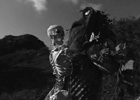 There isn't much not to like about this homage to 1950s monster movies.
The terrible special effects and editing are second only to the
absurdity of plot and awful dialog. The whole package, which was filmed
outside of LA for $10,000, is hilarious. It's one of those movies that
will install new catchphrases into our culture in no time flat.
The film follows scientist Dr. Paul Armstrong and his wife, Betty, on a
trip to examine a meteor which recently fell. Dr. Armstrong believes
that the meteor will be rich in Atmospherium, a very valuable element.
Unfortunately, there are other parties in need of Atmospherium,
including two aliens who have crash landed on Earth and a mad scientist
who needs the element to revive the Lost Skeleton of Cadavra.
It's hard to do this film justice in words, but lovers of cheesy black
and white monster films of yore should love this film. My only real
complaint is that about 15 minutes of nonsense could have probably been
edited out, but then again, the films that this one is paying tribute
to had the same problem, so if it was well-edited it would probably
seem less authentic. This film is currently in very limited release
around the country, and may never see wide release, but if the
opporunity is there, Lost Skeleton is one to be caught in the theater.
There isn't much not to like about this homage to 1950s monster movies.
The terrible special effects and editing are second only to the
absurdity of plot and awful dialog. The whole package, which was filmed
outside of LA for $10,000, is hilarious. It's one of those movies that
will install new catchphrases into our culture in no time flat.
The film follows scientist Dr. Paul Armstrong and his wife, Betty, on a
trip to examine a meteor which recently fell. Dr. Armstrong believes
that the meteor will be rich in Atmospherium, a very valuable element.
Unfortunately, there are other parties in need of Atmospherium,
including two aliens who have crash landed on Earth and a mad scientist
who needs the element to revive the Lost Skeleton of Cadavra.
It's hard to do this film justice in words, but lovers of cheesy black
and white monster films of yore should love this film. My only real
complaint is that about 15 minutes of nonsense could have probably been
edited out, but then again, the films that this one is paying tribute
to had the same problem, so if it was well-edited it would probably
seem less authentic. This film is currently in very limited release
around the country, and may never see wide release, but if the
opporunity is there, Lost Skeleton is one to be caught in the theater.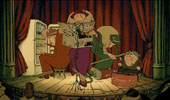 Released last year to limited distribution, this feature-length
animated film is finally coming around to more theaters, thanks to some
award nominations. Although it's considered a French film, with
production in Belgium, Canada, and the Czech Republic, it screams of
Montreal. Who else would openly admit to heavily soaking in the
music/pop/art cultures of both the French and the Americans
(re-performing the mmusic on various musical non-instruments) while
blatently poking fun at each (without being completely degrading)? It's
a semi-musical semi-surrealistic culture clash, with a linguistic mix
of French and English, void of subtitles. (They're not necessary
anyhow.) An old woman and her grandson live together in France, enjoy
old Vaudville-like (from the fictitious Bellville) musical productions
on the TV, have a cute dog, and the grandson is a bicyclist. But,
during the Tour de France, something awful happens and it's up to the
grandmother, dog, and the aging Triplets of Bellville to do something
about it. The adventure is fun, the tunes are catchy (while almost
completely nonsensical), and the animation is something to be enjoyed
on the large screen. It's also a bit of a tribute to older cartoons in
a few ways: most notably that old Looney Tunes cartoons weren't always
just for kids and Disney films of yesteryear had both tragedy and a
moral. The quirky animation and bouncy tunes are something most
definitely to be experienced on the large screen as to be fully
appreciated. (Don't leave during the credits since there's something
afterwards too!) Due to its short length, animated shorts are appearing
with it across the USA. For those as lucky as I was, the theater showed
Destino,
a short begun by Salvador Dali and completed recently, as Disney was
originally planning to use some of the surrealistic adventures in a
series of Fantasias, which were never completed. A number of famous
Dali paintings come to life with a retro soundtrack which is absolutely
out of this world. Once again, the big screen experience is truly
breathtaking.
Released last year to limited distribution, this feature-length
animated film is finally coming around to more theaters, thanks to some
award nominations. Although it's considered a French film, with
production in Belgium, Canada, and the Czech Republic, it screams of
Montreal. Who else would openly admit to heavily soaking in the
music/pop/art cultures of both the French and the Americans
(re-performing the mmusic on various musical non-instruments) while
blatently poking fun at each (without being completely degrading)? It's
a semi-musical semi-surrealistic culture clash, with a linguistic mix
of French and English, void of subtitles. (They're not necessary
anyhow.) An old woman and her grandson live together in France, enjoy
old Vaudville-like (from the fictitious Bellville) musical productions
on the TV, have a cute dog, and the grandson is a bicyclist. But,
during the Tour de France, something awful happens and it's up to the
grandmother, dog, and the aging Triplets of Bellville to do something
about it. The adventure is fun, the tunes are catchy (while almost
completely nonsensical), and the animation is something to be enjoyed
on the large screen. It's also a bit of a tribute to older cartoons in
a few ways: most notably that old Looney Tunes cartoons weren't always
just for kids and Disney films of yesteryear had both tragedy and a
moral. The quirky animation and bouncy tunes are something most
definitely to be experienced on the large screen as to be fully
appreciated. (Don't leave during the credits since there's something
afterwards too!) Due to its short length, animated shorts are appearing
with it across the USA. For those as lucky as I was, the theater showed
Destino,
a short begun by Salvador Dali and completed recently, as Disney was
originally planning to use some of the surrealistic adventures in a
series of Fantasias, which were never completed. A number of famous
Dali paintings come to life with a retro soundtrack which is absolutely
out of this world. Once again, the big screen experience is truly
breathtaking. It isn't surprising this surfing documentary is in the vein of Endless Summer, given that the director is the son of the director of that surfing classic. This film, however, does not follow two surfers around the globe, but instead features many surfers from around the globe. The surfing of today, however, is moving in directions never even dreamed of in 1966. The introduction of tow surfing (using a jet ski to tow the surfer into waves too big to be paddled into) and hydrofoil surfing (modified surfboards with hydrofoils attached to the bottom allowing the surfer to rise a few feet above the water) are allowing surfers to ride waves that were never before within reach.
It isn't surprising this surfing documentary is in the vein of Endless Summer, given that the director is the son of the director of that surfing classic. This film, however, does not follow two surfers around the globe, but instead features many surfers from around the globe. The surfing of today, however, is moving in directions never even dreamed of in 1966. The introduction of tow surfing (using a jet ski to tow the surfer into waves too big to be paddled into) and hydrofoil surfing (modified surfboards with hydrofoils attached to the bottom allowing the surfer to rise a few feet above the water) are allowing surfers to ride waves that were never before within reach.
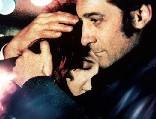 Sometimes you are so carried away by the cinematography a film, that
dialog
isn't required. Sometimes the direction and acting is so powerful that
the
characters are brought to life almost entirely without the use of
words.
This is not one of those films. Sometimes a film bores you to the point
of
slumber. Sometimes a film tries for high-concept and fails. This IS one
of those films.
Friday Night follows a woman who is moving in with her boyfriend
tomorrow
and is finishing the last of her packing. When she finishes, she jumps
in
the car to attend dinner at a friend's house. Due to a Paris transit
strike, the city is in gridlock. Based on radio requests for citizens
to
car-pool, she invites a stranger to get out of the cold and join her in
her
warm Peugeot. A near-dialogless hour later, they are fucking.
I went into this film expecting a French chick flick, but when my
girlfriend nudged me to wake me up, asking how much longer the movie
was, I realized that it just sucked. This movie would clearly be
nominated in the category "Boring Film of the Year" along with "Gerry",
and it clearly takes the "Lack of Dialog" Oscar for 2003. Don't see
this movie.
Sometimes you are so carried away by the cinematography a film, that
dialog
isn't required. Sometimes the direction and acting is so powerful that
the
characters are brought to life almost entirely without the use of
words.
This is not one of those films. Sometimes a film bores you to the point
of
slumber. Sometimes a film tries for high-concept and fails. This IS one
of those films.
Friday Night follows a woman who is moving in with her boyfriend
tomorrow
and is finishing the last of her packing. When she finishes, she jumps
in
the car to attend dinner at a friend's house. Due to a Paris transit
strike, the city is in gridlock. Based on radio requests for citizens
to
car-pool, she invites a stranger to get out of the cold and join her in
her
warm Peugeot. A near-dialogless hour later, they are fucking.
I went into this film expecting a French chick flick, but when my
girlfriend nudged me to wake me up, asking how much longer the movie
was, I realized that it just sucked. This movie would clearly be
nominated in the category "Boring Film of the Year" along with "Gerry",
and it clearly takes the "Lack of Dialog" Oscar for 2003. Don't see
this movie.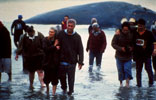 There aren't many pictures that portray the life of the modern Maori.
This film attempts to show how a Maori tribe tries to resolve its
history with its future, as it tries to find a successor for the
current chief, Koro. On the day Koro is expecting two twin
grandchildren, he loses one of the children as well as their mother. He
is left with Paikea, which disappoints him as the culture does not
allow female chiefs. It doesn't take a leap of the imagination to
figure out where the movie goes from there. While this film is
predictable at times, and it could have used a bit more trimming before
being delivered to the theater, this cute little film is worth seeing
(especially on a date). The actress who played Paikea, Keisha
Castle-Hughes, is a rarity: a child actor who can act. She conveys
emotion better than many adult actors, and had no trouble running along
the adult actors in the film (all of which were also good). Whale Rider
isn't the best film of the year, nor is it perfect by any stretch. What
it is, though, is a fun, happy movie that doesn't pander to the
audience.
There aren't many pictures that portray the life of the modern Maori.
This film attempts to show how a Maori tribe tries to resolve its
history with its future, as it tries to find a successor for the
current chief, Koro. On the day Koro is expecting two twin
grandchildren, he loses one of the children as well as their mother. He
is left with Paikea, which disappoints him as the culture does not
allow female chiefs. It doesn't take a leap of the imagination to
figure out where the movie goes from there. While this film is
predictable at times, and it could have used a bit more trimming before
being delivered to the theater, this cute little film is worth seeing
(especially on a date). The actress who played Paikea, Keisha
Castle-Hughes, is a rarity: a child actor who can act. She conveys
emotion better than many adult actors, and had no trouble running along
the adult actors in the film (all of which were also good). Whale Rider
isn't the best film of the year, nor is it perfect by any stretch. What
it is, though, is a fun, happy movie that doesn't pander to the
audience.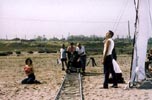 A documentary investigating the method behind the madness of the man who
gave his name to a word which has come to suggest that which is over the top
and grotesque, Fellini: I'm a Born Liar, will undoubtedly delight
anyone who enjoys the director's films. The problem with this is, if you're
not familiar with more than one or two of Federico Fellini's works, or have
only a passing interest, chances are that large portions of it may be
incomprehensible. Director Damian Pettigew takes a giant step back from his
subject (contrasted by what is often very tight close-ups of his subject's
face), devoting around 80% of the film to interviews with the man himself,
conducted shortly before Fellini's death in 1993. It is interspersed by
interviews with some of il maestro's co-conspirators, including his
screenwriter, lighting director, and cameraman; actors Terence Stamp, Donald
Sutherland and Roberto Benigni; and Oulipo novelist Italo Calvino (whose
place in the Fellini universe is not really made clear, although his
commentary is insightful, as would be expected).
A documentary investigating the method behind the madness of the man who
gave his name to a word which has come to suggest that which is over the top
and grotesque, Fellini: I'm a Born Liar, will undoubtedly delight
anyone who enjoys the director's films. The problem with this is, if you're
not familiar with more than one or two of Federico Fellini's works, or have
only a passing interest, chances are that large portions of it may be
incomprehensible. Director Damian Pettigew takes a giant step back from his
subject (contrasted by what is often very tight close-ups of his subject's
face), devoting around 80% of the film to interviews with the man himself,
conducted shortly before Fellini's death in 1993. It is interspersed by
interviews with some of il maestro's co-conspirators, including his
screenwriter, lighting director, and cameraman; actors Terence Stamp, Donald
Sutherland and Roberto Benigni; and Oulipo novelist Italo Calvino (whose
place in the Fellini universe is not really made clear, although his
commentary is insightful, as would be expected).It is surprising, however, that the actors chosen to be interviewed were such minor players in Fellini's body of work (not to mention that they also appeared in the worst amongst his films). I would have found their inclusion diappointing, were not Sutherland (who found the director to be an unrelenting tyrant) and Stamp, in particular, so entertaining. Stamp's Fellini impression is alone worth the price of admission. Furthermore, there were no interviews with Marcello Mastroianni, the actor who appeared in the most important of his films, even though the director, Damian Pettigrew acknowledged his vast importance to Fellini's work. Even more surprisingly, there wasn't a single interview with any woman who appeared in his films. Given the immense impact women had both in his life and on his work, I was shocked that a documentary on Fellini could not include anything about Anouk Aimee, Sandra Milo or Anita Ekberg. There was a fleeting mention of Giulietta Masina, Fellini's long-time wife and collaborator, but no interviews. Perhaps none survived after her death in 1994, but I find that difficult to believe. Aimee, Milo and Ekberg, on the other hand, are all still living.
Although rather academic at times, the film's strong point is surely the lengthy ruminations by Fellini himself on the magic behind the creation of his films, and the inclusion of archival footage of the director in the process of directing his masterpieces Amarcord, La Dolce Vita, and one of the most important films in the history of cinema, 8½. Despite the fact that Pettigrew's documentary has a lot of room for improvement, and that it's not exactly a "Fellini 101," it remains a must-see for anyone who appreciates il maestro or has a passion for movies and the complicated processes that go into their creation.
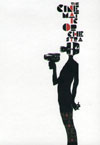 The main focus of this DVD is to showcase Dziga Vertov's 1929 classic silent movie Man With a Movie Camera
accompanied by the well-suited, modern soundtrack provided by Jason
Swinscoe and the Cinematic Orchestra. Originally described as "an
experiment in cinematic communication of real events," the storyless
film gives an insight into city life in Russian during the late 1920's,
showing everyday scenes such as the birth of a child, various modes of
transportation in action, factory work, sporting events and the usual
hustle and bustle of downtown life. From the first ten minutes of the
film, it's very apparent that the Cinematics have taken great care in
reworking previous tunes of theirs and adding some newer material to
turn the methodical tasks shown on the screen into living art set to
music. There are some very strong moments when the soundtrack acts as
the musical translation of what's happening on the screen. The token
DVD extras include a mini-documentary/interview with Swinscoe
describing how soundtracking the film came about, interspersed with
live performance clips of the band, a photo gallery from the recording
session and various related links. Other bonuses include the group in
fine form performing "Man With The Movie Camera" and the Art Ensemble
of Chicago's "Theme de Yoyo" to a packed club audience. The video for
"All That You Give" featuring Fontella Bass is also included for good
measure. Although it had been available on the song's CD single as a
Quicktime movie, watching it on a television makes it all the better. I
had been expecting the DVD to include the much talked about performance
of the group providing the live soundtrack. From the couch, seeing the
actual film set to a great soundtrack rather than watching it as a
backdrop during a concert film was definitely the way to go.
The main focus of this DVD is to showcase Dziga Vertov's 1929 classic silent movie Man With a Movie Camera
accompanied by the well-suited, modern soundtrack provided by Jason
Swinscoe and the Cinematic Orchestra. Originally described as "an
experiment in cinematic communication of real events," the storyless
film gives an insight into city life in Russian during the late 1920's,
showing everyday scenes such as the birth of a child, various modes of
transportation in action, factory work, sporting events and the usual
hustle and bustle of downtown life. From the first ten minutes of the
film, it's very apparent that the Cinematics have taken great care in
reworking previous tunes of theirs and adding some newer material to
turn the methodical tasks shown on the screen into living art set to
music. There are some very strong moments when the soundtrack acts as
the musical translation of what's happening on the screen. The token
DVD extras include a mini-documentary/interview with Swinscoe
describing how soundtracking the film came about, interspersed with
live performance clips of the band, a photo gallery from the recording
session and various related links. Other bonuses include the group in
fine form performing "Man With The Movie Camera" and the Art Ensemble
of Chicago's "Theme de Yoyo" to a packed club audience. The video for
"All That You Give" featuring Fontella Bass is also included for good
measure. Although it had been available on the song's CD single as a
Quicktime movie, watching it on a television makes it all the better. I
had been expecting the DVD to include the much talked about performance
of the group providing the live soundtrack. From the couch, seeing the
actual film set to a great soundtrack rather than watching it as a
backdrop during a concert film was definitely the way to go. There has been alot of buzz about this movie redefining or reinvigorating
the zombie genre. Sometimes, critics go as far as saying that this movie
has breathed new life into the entire horror genre. I am going to go even
further and say that in this year of stale sequels, rehashed plots, and
indie documentaries, "28 Days Later" has reinvigorated my interest in the
cinema. Director Danny Boyle ("Trainspotting", "Shallow Grave") and writer
Alex Garland, while obviously drawing from many sources in both direction
and script, have created a film which really sinks its teeth into the minds
of the audience.
There has been alot of buzz about this movie redefining or reinvigorating
the zombie genre. Sometimes, critics go as far as saying that this movie
has breathed new life into the entire horror genre. I am going to go even
further and say that in this year of stale sequels, rehashed plots, and
indie documentaries, "28 Days Later" has reinvigorated my interest in the
cinema. Director Danny Boyle ("Trainspotting", "Shallow Grave") and writer
Alex Garland, while obviously drawing from many sources in both direction
and script, have created a film which really sinks its teeth into the minds
of the audience. A group of animal rights hippies break into the Cambridge Primate Research Facility trying to save some monkeys. In the process they let loose Rage, which within 10 to 20 seconds after infecting a human turns them into a zombie-like maniac out for blood. Fast-forward 28 days and we find our protagonist, Jim (Cillian Murphy) waking up from a coma in a deserted hospital. Jim meets up with a handful of other survivors of the disease in an otherwise abandoned London.
Does this film derive from other work? Certainly. Is, at it's heart, this movie still just a zombie flick? Yes, but it's a damn good one. Every time you think you expect a horror movie cliche to pop out of the woodwork Boyle surprises you and has the characters do the expected believable thing. The reason critics are amazed is because this movie is intelligent, which seperates it from its peers. But that handicapped judging doesn't change the fact that this is a wonderful film.
 The Friedman Family loved film, and seemingly lived their lives through
the lens of a 8mm or video camera. The footage they captured showed
children frolicking, lame family skits, and the complete disintegration
of the family after the father (Arnold) and one of his sons (Jesse) are
brought up on hundreds of child molestation charges. This family's
fascination and connection to film is inexplicable, filming fights,
insanity, and even post-prison reunions. While it sounds like a "clever
indie" rehash of "The Truman Show", Capturing the Friedmans
is an entirely true story, brought to us by HBO Documentaries and
Magnolia Pictures. Through modern interviews with the children and
mother juxtaposed with tons of family footage we get to see a suburban
NY family fall apart and eventually turn on each other. I was deeply
disturbed on many levels. The obvious aspect of child molestation
notwithstanding, the willingness of this family to videotape the most
intimate aspects of their life (and then to allow this laundry to be
aired to the world) really stunned me. It simply amazes me how
disconnected the family is from each other, and in some cases reality.
HBO has impressed me over the course of the past few years with the
quality of their in-house productions, and this film is no exception.
The Friedman Family loved film, and seemingly lived their lives through
the lens of a 8mm or video camera. The footage they captured showed
children frolicking, lame family skits, and the complete disintegration
of the family after the father (Arnold) and one of his sons (Jesse) are
brought up on hundreds of child molestation charges. This family's
fascination and connection to film is inexplicable, filming fights,
insanity, and even post-prison reunions. While it sounds like a "clever
indie" rehash of "The Truman Show", Capturing the Friedmans
is an entirely true story, brought to us by HBO Documentaries and
Magnolia Pictures. Through modern interviews with the children and
mother juxtaposed with tons of family footage we get to see a suburban
NY family fall apart and eventually turn on each other. I was deeply
disturbed on many levels. The obvious aspect of child molestation
notwithstanding, the willingness of this family to videotape the most
intimate aspects of their life (and then to allow this laundry to be
aired to the world) really stunned me. It simply amazes me how
disconnected the family is from each other, and in some cases reality.
HBO has impressed me over the course of the past few years with the
quality of their in-house productions, and this film is no exception. I have never been a fan of They Might Be Giants, but I became excited
when given the opportunity to screen "Gigantic (A Tale of Two Johns)".
Perhaps it was all the good press the documentary received after it's
release in 2002, or some "Behind the Music"-inspired voyeurism.
Regardless of the cause, I was excited to see this portrait of John
Linnell and John Flansburgh.
This film is a fairly straightforward look into the past and present of
They Might Be Giants. From the meeting of the two Johns in grade
school, through the beginnings of the group, to the release of their
2001 studio album "Mink Car" (Which was released on Sept. 11th). The
film features quite a bit of live footage, as well as some dramatic
readings of TMBG lyrics by people such as Michael McKean, Harry
Shearer, Janeane Garofalo, and Andy Richter. The film surprised me on
many levels. First of all, the film was very focused on the work and
history of the band, completely obscuring the personal lives of the two
Johns. Also, the movie managed to contain no references to the Sept.
11th attacks, which was a refreshing change of pace. This movie is
definitely not for TMBG haters, but it can be enjoyable for both people
on the fence and the die hard fans.
I have never been a fan of They Might Be Giants, but I became excited
when given the opportunity to screen "Gigantic (A Tale of Two Johns)".
Perhaps it was all the good press the documentary received after it's
release in 2002, or some "Behind the Music"-inspired voyeurism.
Regardless of the cause, I was excited to see this portrait of John
Linnell and John Flansburgh.
This film is a fairly straightforward look into the past and present of
They Might Be Giants. From the meeting of the two Johns in grade
school, through the beginnings of the group, to the release of their
2001 studio album "Mink Car" (Which was released on Sept. 11th). The
film features quite a bit of live footage, as well as some dramatic
readings of TMBG lyrics by people such as Michael McKean, Harry
Shearer, Janeane Garofalo, and Andy Richter. The film surprised me on
many levels. First of all, the film was very focused on the work and
history of the band, completely obscuring the personal lives of the two
Johns. Also, the movie managed to contain no references to the Sept.
11th attacks, which was a refreshing change of pace. This movie is
definitely not for TMBG haters, but it can be enjoyable for both people
on the fence and the die hard fans. While at first glance a documentary following 8 contestants in the
1999 National Spelling Bee might seem like a sleeper, don't obey your
instincts: If this film was fiction it may very well have been directed by
Christopher Guest. This movie is hilarious, both intentionally and
inadvertently, throughout its 95 minute duration. (And don't be fooled by
the title, this film has nothing to do with the fantastic Hitchcock film of
the same name starring the late Gregory Peck.)
It was interesting to see a filmmaker take a subject I could
care less about (it's my opinion that spelling competitions are even less
important that Trivial Pursuit) and have me on the edge of my seat. There
is plenty to love in this film, whether it is the hyperactive spaz who
"talks like a musical robot", or the stereotypical mom who decorates her
house with bees.
I guess the only thing I would like to have seen in the film would have been
a epilogue visiting the children again today (the film was shot in 1999).
It'd be nice to find out how many of the kids went on to compete again in
following years. This is a tense, well-edited film that most people can
enjoy. While it probably doesn't require the big screen, the communal
laughter makes it worth the theater price.
While at first glance a documentary following 8 contestants in the
1999 National Spelling Bee might seem like a sleeper, don't obey your
instincts: If this film was fiction it may very well have been directed by
Christopher Guest. This movie is hilarious, both intentionally and
inadvertently, throughout its 95 minute duration. (And don't be fooled by
the title, this film has nothing to do with the fantastic Hitchcock film of
the same name starring the late Gregory Peck.)
It was interesting to see a filmmaker take a subject I could
care less about (it's my opinion that spelling competitions are even less
important that Trivial Pursuit) and have me on the edge of my seat. There
is plenty to love in this film, whether it is the hyperactive spaz who
"talks like a musical robot", or the stereotypical mom who decorates her
house with bees.
I guess the only thing I would like to have seen in the film would have been
a epilogue visiting the children again today (the film was shot in 1999).
It'd be nice to find out how many of the kids went on to compete again in
following years. This is a tense, well-edited film that most people can
enjoy. While it probably doesn't require the big screen, the communal
laughter makes it worth the theater price.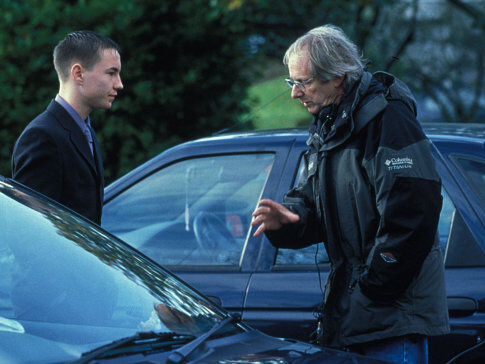 Ken Loach's film is a dark portrait of a boy growing up in
Scotland. We meet Liam, the film's protagonist, as he counts down the
final
weeks of his mom's prison sentence. His mother, who is set to be
released
on the eve of Liam's 16th birthday, was apparently busted for drugs
some
time ago. Liam decides to get things together to keep his mom out of
"trouble" after her release by arranging a new place to live away from
her
abusive boyfriend.
Not satisfied with the pace of earnings generated by selling stolen
cigarettes, Liam decides to steal some Heroin from her mom's boyfriend
and
sell it with his buddy Pinball. As you can imagine, hilarity ensues.
Having watched this film a few days ago I am still uncertain how to
react to
it. On one hand, it is a wonderful character study and really nails the
"teenage boy" mentality. On the other, it seems terribly jaded and has
that
Dead Zone-esque "I know what's going to happen but I can't do anything
to
stop it" feel. I really enjoyed the film, but something is nagging at
me
about it that I can't identify. While I recommend it, I can't
promise anything.
One final note: the film is
subtitled in english for those who have trouble with thick Scottish
accents. All slang remains intact, but it is easier to read than listen
to.
Ken Loach's film is a dark portrait of a boy growing up in
Scotland. We meet Liam, the film's protagonist, as he counts down the
final
weeks of his mom's prison sentence. His mother, who is set to be
released
on the eve of Liam's 16th birthday, was apparently busted for drugs
some
time ago. Liam decides to get things together to keep his mom out of
"trouble" after her release by arranging a new place to live away from
her
abusive boyfriend.
Not satisfied with the pace of earnings generated by selling stolen
cigarettes, Liam decides to steal some Heroin from her mom's boyfriend
and
sell it with his buddy Pinball. As you can imagine, hilarity ensues.
Having watched this film a few days ago I am still uncertain how to
react to
it. On one hand, it is a wonderful character study and really nails the
"teenage boy" mentality. On the other, it seems terribly jaded and has
that
Dead Zone-esque "I know what's going to happen but I can't do anything
to
stop it" feel. I really enjoyed the film, but something is nagging at
me
about it that I can't identify. While I recommend it, I can't
promise anything.
One final note: the film is
subtitled in english for those who have trouble with thick Scottish
accents. All slang remains intact, but it is easier to read than listen
to.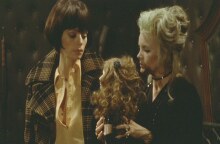 Based on the S&M comics of Guido Crepax, Baba Yaga is a trippy blur
between reality and dreamlife set in swingin' Milan. Made in 1973, it was
one of only two feature films directed by Corrado Farina, which is a shame
given that he is clearly a man with a vision (maybe not a budget, but
definitely a vision). Valentina (model and Euro-starlet Isabelle de Funes)
is an attractive fashion photographer who bears an uncanny resemblance to
Louise Brooks, partying with models, artists and left-wing intellectuals as
the film begins. As she stumbles back to her apartment late that night,
after stubbornly insisting to her friends that she walk alone, she
encounters a mysterious, elegant, older blonde woman (Carroll Baker of
Baby Doll infamy) when she nearly hits Valentina with her Rolls Royce.
She is clearly smitted by the young woman, and after insisting on giving her
a ride home, she introduces herself simply as "Baba Yaga", takes one of
Valentina's garters and disappears into the night.
Based on the S&M comics of Guido Crepax, Baba Yaga is a trippy blur
between reality and dreamlife set in swingin' Milan. Made in 1973, it was
one of only two feature films directed by Corrado Farina, which is a shame
given that he is clearly a man with a vision (maybe not a budget, but
definitely a vision). Valentina (model and Euro-starlet Isabelle de Funes)
is an attractive fashion photographer who bears an uncanny resemblance to
Louise Brooks, partying with models, artists and left-wing intellectuals as
the film begins. As she stumbles back to her apartment late that night,
after stubbornly insisting to her friends that she walk alone, she
encounters a mysterious, elegant, older blonde woman (Carroll Baker of
Baby Doll infamy) when she nearly hits Valentina with her Rolls Royce.
She is clearly smitted by the young woman, and after insisting on giving her
a ride home, she introduces herself simply as "Baba Yaga", takes one of
Valentina's garters and disappears into the night.The unusual meeting gives way to some bizarrely erotic dreams for Valentina, and these dreams are wherein lies some of the film's real innovation, and also, some real confusion.
Nazis, surreal boxing matches, hippies and bondage dolls that come to life a la Der Golem begin popping up so fast, you'll no doubt have to hit the rewind button more than a few times just to see if you missed something! But ultimately, it's the mood of Baba Yaga that is its strong point. It's not quite a horror film, despite the murders and violence, and it's not quite a sex film, despite the nudity and erotic overtones. Furthermore, it is unclear what exactly what underlying political message that Farina is trying to convey with his unsual, yet striking imagery. Creative cinematography, eye-popping sets and costumes, loads of cheesy dialogue, and a funky score by Piero Umiliani all make for great entertainment, even if the plot is mildly incomprehensible.
 Based on a true story, this film has been described as the "Lost Weekend"
of gambling movies, and that is probably an accurate description. Philip
Seymour Hoffman takes another turn as a depressing weirdo playing this bank
manager who scams his employer out of millions of dollars which he pisses
away at casinos in Atlantic City and Las Vegas. Dan Mahowny
(Hoffman) is the true addict, ignoring everything special in his life for
the game.
Based on a true story, this film has been described as the "Lost Weekend"
of gambling movies, and that is probably an accurate description. Philip
Seymour Hoffman takes another turn as a depressing weirdo playing this bank
manager who scams his employer out of millions of dollars which he pisses
away at casinos in Atlantic City and Las Vegas. Dan Mahowny
(Hoffman) is the true addict, ignoring everything special in his life for
the game.I like Hoffman, but I can't escape the feeling that he is being given too much credit as an actor. It seems like every critic is raving about him, yet I can't shake the notion that he always plays similar roles. Seeing him as another awkward loser with a problem didn't do anything to help my opinion of him. Fortunately for him, he does an amazing job at playing the loser. Minnie Driver was almost unrecognizable to me as Mahowny's girlfriend Belinda. For me, the stand-out performance, however, was John Hurt, who was just wonderful as an Atlantic City casino boss.
This film did an amazing job of conveying the disconnect inside the head of gambling addicts, ignoring the odds and insisting that they will win big. While the film had some minor melodramatic moments, it also was a fantastic (if not depressing) look into a world that most people never see. It is difficult to see this film and leave the theater happy, but it is still a film worth seeing.
 I wasn't planning on seeing Phone Booth as I felt that once the movie Sniper
was made, there was little room for another film about a sniper. But a
friend dropped by unexpectedly looking to go to a movie, and it was the
only one neither of us had seen. My expectations were correct, and this
film was pretty bad. What I didn't expect, however, was a yawnful
performance from Kiefer Sutherland, the film's antagonist, who is never
really shown in focus and who sounded like he was phoning it in. After
seeing the movie I found out that Sutherland was brought in after the
film was shot to replace another actor, which explains some of his
disappointing work, but not all of it.
I wasn't planning on seeing Phone Booth as I felt that once the movie Sniper
was made, there was little room for another film about a sniper. But a
friend dropped by unexpectedly looking to go to a movie, and it was the
only one neither of us had seen. My expectations were correct, and this
film was pretty bad. What I didn't expect, however, was a yawnful
performance from Kiefer Sutherland, the film's antagonist, who is never
really shown in focus and who sounded like he was phoning it in. After
seeing the movie I found out that Sutherland was brought in after the
film was shot to replace another actor, which explains some of his
disappointing work, but not all of it.
The premise of this movie seems to be this: Colin Farrell is a complete dick to everyone around him, and he gets his comeuppance one day after randomly answering a pay phone which is marked by a sniper. The sniper taunts him and forces him to own up to all the people he has treated like shit. That's the whole movie. If you are reading this, wondering to yourself how that movie could be stretched into 90 minutes, well, after a good 50 minutes in the theater I started thinking the same thing myself. While this film was no Gerry, it was definitely too long and would have been better as a 60 minute TV movie.
I have heard from several ladies and gay men that Colin Farrell is a hottie. It would seem that, since Farrell is pretty much the sole target of the cameras in this film, that if you have a Colin Farrell crush this movie would scratch that itch. Unfortunately, the man can't act, so if you are looking for an enjoyable performance, you won't get it here. This film was due to be released much earlier but was delayed because the studio felt it was too close to the DC sniper killings. Perhaps it needed to be delayed longer so they could make it good, or delayed straight to video.
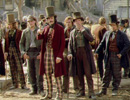 This is the second week in a row that I am slow on the uptake. Last week's review of Willard came a few weeks after I saw the film. This week's film, "Gangs of New York" came out months ago, but I just got around to seeing it this week. I had been trying to get someone, anyone, to see this film with me, but all of my friends bailed out on me. Most cited the length of the movie, which in my movie snobbery leads me to believe that they don't truly like movies.
This is the second week in a row that I am slow on the uptake. Last week's review of Willard came a few weeks after I saw the film. This week's film, "Gangs of New York" came out months ago, but I just got around to seeing it this week. I had been trying to get someone, anyone, to see this film with me, but all of my friends bailed out on me. Most cited the length of the movie, which in my movie snobbery leads me to believe that they don't truly like movies.
 Along with the strong, the blessed also survive, as Sam Moore describes himself in this sweaty film from experienced documentarians DA Pennebaker (Monterey Pop, Ziggy Stardust, Don't Look Back, 101) and Chris Hegedus (Down from the Mountain, Startup.com). This film definitely feels like one of Pennebaker's concert films and less like a documentary proper. While there is nothing wrong with seeing concert footage of some amazing performers, it was hard to not feel let down by the lack of depth to this documentary.
Along with the strong, the blessed also survive, as Sam Moore describes himself in this sweaty film from experienced documentarians DA Pennebaker (Monterey Pop, Ziggy Stardust, Don't Look Back, 101) and Chris Hegedus (Down from the Mountain, Startup.com). This film definitely feels like one of Pennebaker's concert films and less like a documentary proper. While there is nothing wrong with seeing concert footage of some amazing performers, it was hard to not feel let down by the lack of depth to this documentary.
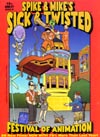 Spike & Mike's Sick and Twisted Festival of Animation seems to have been going downhill the past few years, and this year really sealed the deal for me. I don't think I am going to bother attending next year's screening. The simple problem is this: there isn't enough new stuff for me to continue to send my ticket money their way. This year's flyer advertised "28 New Films! Now With 75% More Than Last Year!" The problem is that with the advent of the Internet, I had already seen the more clever shorts, and the ones that I hadn't seen were lackluster at best.
Spike & Mike's Sick and Twisted Festival of Animation seems to have been going downhill the past few years, and this year really sealed the deal for me. I don't think I am going to bother attending next year's screening. The simple problem is this: there isn't enough new stuff for me to continue to send my ticket money their way. This year's flyer advertised "28 New Films! Now With 75% More Than Last Year!" The problem is that with the advent of the Internet, I had already seen the more clever shorts, and the ones that I hadn't seen were lackluster at best.



















